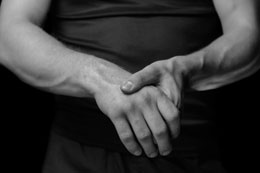As per the United States Bone and Joint Decade, 1 out of 7 people in America, suffer from some or the other type of pain in their joints. Joint pain puts restriction on the movements of an individual, thus affecting his active life. Read on to know more about its causes.

Proper functioning of joints is necessary because each of our movement makes use of some or the other joint in the body. Joint dysfunction can put a lot of restriction on our day-to-day life. Joint pain or arthritis has taken the form of a major health issue all over the world. Obesity is the primary cause of premature joint pain. Although, the causes may vary, the discomfort associated with each type is the same.
Over the years our joints tend to degenerate due to excessive usage. This results in weakening of muscles, tendons and the cartilage. The synovial fluid that cushions the joints also runs out. This makes the movement of the joint extremely uncomfortable and painful. Although, it is more common in the elderly, it is not unusual to find young people suffering from this disorder as well. The major causes of untimely joint pain are obesity and sedentary lifestyle. Besides, there are several other causes that are discussed below.
Obesity
As mentioned above, obesity is one of the primary causes of joint pain. Every one pound gain in weight results in additional four pounds of load on the joints. This is sufficient to understand how much stress we put on our joints. Naturally, those who are overweight subject their joints to tremendous stress, resulting in early wear and tear of the muscles, cartilage and tendons in that area.
Hereditary
Heredity is also a cause of joint pain in a few cases. If your family medical history reflects poor joint function, you should take proactive measures to avoid the pain. Knowing that you are prone to pain in the joints, improves your chances of evading it by taking precautionary measures, and it also helps the doctor to begin the corresponding treatment.
Repeated Stress Injury (RSI)
Repeated stress injury arises due to overuse of a certain joint for a long period. Athletes and other sports persons are susceptible to this form of injury. These people have to put a lot of stress on a particular joint, resulting into its untimely wearing. RSI can also be termed as an occupational hazard as many occupations require you to put stress on the same joint everyday.
Injuries
Injuries such as sprains and fractures which may appear minor at first, can damage the joint in the long run. Such injuries, though occurred in childhood, weaken the joints, but the effects become evident only in later life.
Improper Workouts
Most people are so enthusiastic about beginning their exercise regimen, that they forget to follow a proper routine required for safe and effective exercising. Starting exercises without warming up, prolonged weightlifting or other strenuous forms of exercise also weakens the joints. This may also result in dislocation.
Incorrect Posture and Wrong Footwear
Incorrect posture often leads to unnecessary stress on the joints. If your work requires you to sit or stand for a very long time, then doing so with an incorrect posture may lead to joint pain in the long run. Wearing wrong kind of footwear all the time accelerates the chances. High heels for daily use, wrong kind of shoes for jogging or running can definitely lead to pain in the joints.
Weak Auto Immune System and Lack of Nutrition
A weak immune system fails in regenerating the proper functioning of the joints. Also, certain nutrients are required for the regeneration of muscles and cartilage and production of the synovial fluid. If your diet fails to provide these nutrients, then joint discomfort may arise.
The only way to avoid or cure joint pain is by maintaining an active lifestyle. Exercises should be done in moderation and using the correct techniques only. Consuming the prescribed arthritis diet also helps to overcome it.


 Proper functioning of joints is necessary because each of our movement makes use of some or the other joint in the body. Joint dysfunction can put a lot of restriction on our day-to-day life. Joint pain or arthritis has taken the form of a major health issue all over the world. Obesity is the primary cause of premature joint pain. Although, the causes may vary, the discomfort associated with each type is the same.
Proper functioning of joints is necessary because each of our movement makes use of some or the other joint in the body. Joint dysfunction can put a lot of restriction on our day-to-day life. Joint pain or arthritis has taken the form of a major health issue all over the world. Obesity is the primary cause of premature joint pain. Although, the causes may vary, the discomfort associated with each type is the same.